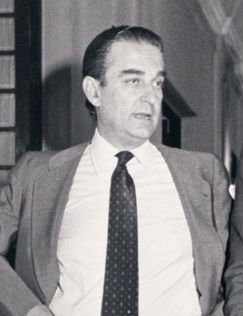Landelino Lavilla facts for kids
Quick facts for kids
Landelino Lavilla
|
|
|---|---|

Lavilla in 1981
|
|
| President of the Congress of Deputies | |
| In office 6 April 1979 – 18 November 1982 |
|
| Monarch | Juan Carlos I |
| Prime Minister | Adolfo Suárez |
| Preceded by | Fernando Álvarez de Miranda |
| Succeeded by | Gregorio Peces-Barba |
| Minister of Justice | |
| In office 5 July 1976 – 6 April 1979 |
|
| Preceded by | Antonio Garrigues y Díaz-Cañabate |
| Succeeded by | Íñigo Cavero Lataillade |
| Member of the Congress of Deputies | |
| In office 6 April 1979 – 18 November 1982 |
|
| Constituency | Jaén |
| In office 18 November 1982 – 28 July 1983 |
|
| Constituency | Madrid |
| Member of the Senate | |
| In office 15 June 1977 – 6 April 1979 |
|
| Constituency | Royal appointment |
| Personal details | |
| Born |
Landelino Lavilla Alsina
6 August 1934 Lleida, Spain |
| Died | 13 April 2020 (aged 85) Madrid, Spain |
| Political party | Union of the Democratic Centre |
| Spouse | Juana Rubira |
| Children | 4 |
| Alma mater | |
Landelino Lavilla Alsina (born 6 August 1934 – died 13 April 2020) was an important Spanish lawyer and politician. He served as the Minister of Justice from 1976 to 1979. He was also a member of parliament and a senator.
One of his most important roles was as the President of the Congress of Deputies (like the speaker of parliament). This was during a difficult time in Spain, especially during the 23-F coup attempt in 1981. A famous lawyer, Eduardo García de Enterría, called him a key person in Spain's move towards democracy.
Contents
Early Life and Education
Landelino Lavilla was born in Lleida, Spain, on 6 August 1934. He studied law at two different universities. He earned his law degrees from the University of Zaragoza and the Complutense University of Madrid.
Career and Political Work
Lavilla started his career as a lawyer. In 1958, he joined the legal team for the Court of Auditors. A year later, in 1959, he also joined the State Council.
In 1974, he became part of a group called Tácitos. This group was made up of Catholic reformers. He also became a senior member of the Christian Democratic Party. From 1972, this group published articles in a Catholic newspaper called Ya. Before becoming a minister, he worked as an undersecretary of industry from 1974 to 1976. This was during the last government of Franco.
Serving as Minister of Justice
On 5 July 1976, Landelino Lavilla was chosen to be the Minister of Justice. He joined the first government led by Adolfo Suárez. He took over from Antonio Garrigues y Díaz-Cañabate.
Lavilla was part of the "Tacito group" within this government. Other members included Leopoldo Calvo Sotelo and Marcelino Oreja. He kept his job after the democratic elections in June 1977.
He helped write the 1977 Political Reform Act. This important law was approved by the parliament in November 1977. It created a legal way for all major political groups to become legal. This included communist parties and the PSOE. Lavilla's time as Justice Minister ended on 6 April 1979. Íñigo Cavero then became the new Justice Minister.
President of Congress and the 23-F Coup
In 1977, Lavilla became a senator and served until 1978. In 1979, he was elected to the Congress of Deputies. He represented the Jaén province.
From 1979 to 1982, he was the speaker of the Congress. This was during the first parliament after Spain's new constitution was approved. On 23 February 1981, a serious event happened. Members of the Civil Guard, led by Antonio Tejero, stormed into the parliament chamber. This was a failed attempt to take over the government, known as 23-F.
Lavilla bravely faced Tejero during the coup. He told him, "In this chamber, orders are given by the presidency. This is over. Evict." The colonel listened, and the members of parliament were able to return to their seats. During that night, Lavilla offered the parliament's leaders as hostages. He asked Tejero to free the government members and other lawmakers. However, Tejero refused this offer.
During Lavilla's time as speaker, many important things happened. The first debate to choose a new prime minister took place under the new Constitution. Many laws were approved, including 33 important "organic laws."
Before the 1982 general election, Lavilla led the Christian Democrat party. He was re-elected in 1982, this time representing the Madrid province. However, he left his seat in 1983. Leopoldo Calvo Sotelo took his place. In 1982, Lavilla also became the president of the Union of the Democratic Centre party. But because the party did not do well in the elections, he resigned in February 1983.
Later Life and Contributions
On 28 July 1983, Lavilla was made a permanent member of the Council of State. This was a special appointment by the Prime Minister. He held this important position until he passed away in 2020. In 1995, he became the chairman of the Council's first section.
In 1999, Lavilla became a permanent member of the Royal Academy of Jurisprudence and Legislation. He served as its president from 2003 to 2012. He was re-elected in 2008. He was also a member of the advisory committee for FRIDE, a research organization in Madrid.
Personal Life
Landelino Lavilla was married to Juana Rubira García Valdecasas. They had four children together. He passed away on 13 April 2020, at the age of 85.
Honors
See also
 In Spanish: Landelino Lavilla para niños
In Spanish: Landelino Lavilla para niños
 | Precious Adams |
 | Lauren Anderson |
 | Janet Collins |





